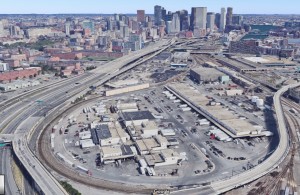A decision by Widett Circle food vendors on a buyer for their 19-acre parcel appears to be imminent, setting up opportunities for a potential multibillion-dollar redevelopment.
The industrial site wedged between I-93 and railroad lines was local officials’ preferred site for a 60,000-seat Olympic stadium during Boston’s short-lived bid for the 2024 games, and has been linked to the New England Revolution’s search for an urban stadium site. It’s also a potential location for a rail layover yard required as part of the South Station expansion project.
The site has attracted widespread interest from potential buyers with four finalists now seeking to acquire the property for up to $200 million, the Boston Business Journal reported.
The property can accommodate 1.7 million square feet of development by right, according to marketing materials prepared by brokers from HFF and Cushman & Wakefield who are representing owners New Boston Food Market. Olympic organizers predicted Widett Circle could be later redeveloped into a neighborhood of 18 city blocks with 4,000 housing units along with commercial space.
The food supplier cooperative was reluctant to sell when the Olympic bid surfaced because of the need to find a replacement site near their clients and supply routes.
“We think we’re close to a resolution on this thing,” said a source familiar with the process. “This group understands the time is right for them to control their own destiny and for too long, they’ve been victims of speculation, whether it be the rail layover or Olympics.”
The food mart’s first preference is to remain in Boston near major highways and routes to Logan International Airport, but they would consider industrial sites in nearby areas such as Chelsea, the source said. The food vendors need approximately 300,000 square feet, preferably in high-bay space with modern building systems, to replace the half-century-old Widett Circle warehouse and processing buildings.
The cooperative which employs approximately 900 people is expected to lease back the Widett Circle property for three years from the new owner, development adviser Michael Vaughan told the BBJ.
Availabilities of industrial space in Boston continue to shrink as properties are redeveloped as multifamily housing and mixed-use projects. The I-93 corridor south of Boston continues to transform, with The Abbey Group proposing 1.6 million square feet of office, lab and retail space at the 5.6-acre Boston Flower Exchange property on Albany Street. On the opposite side of I-93, proposed rezoning of the 144-acre MBTA Red Line corridor from Broadway to Andrew stations would support up to 16 million square feet of new development including high-rise housing in a predominantly industrial area.
Last year, the food mart explored plans to occupy a new facility developed by Boston Global Investors in the Raymond L. Flynn Marine Park, on a parcel owned by the Economic Development Industrial Corp. of Boston. The parcel was too small for the food mart’s needs, Boston Global Investors CEO John Hynes III said, and attempts to combine it with an adjacent parcel owned by Massport were unsuccessful.




 |
| 



